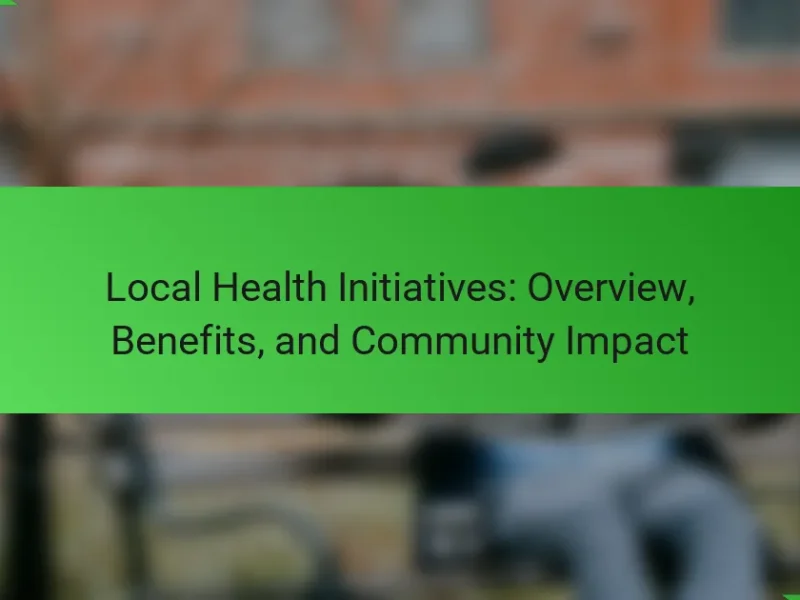Preventive health screenings are essential medical tests designed to identify potential health issues before symptoms manifest, focusing on risks for diseases such as cancer, diabetes, and heart disease. Common types of screenings include mammograms, cholesterol tests, and blood pressure checks, which are crucial for early detection and intervention, ultimately enhancing health outcomes. The U.S. Preventive Services Task Force provides guidelines for these screenings based on age, gender, and individual risk factors. Access to preventive health screenings is available at various local healthcare facilities, including hospitals, community health centers, and pharmacies, with opportunities for free or low-cost screenings often offered by health departments and organizations.

What are Preventive Health Screenings?
Preventive health screenings are medical tests conducted to detect potential health issues before symptoms arise. These screenings aim to identify risks for diseases such as cancer, diabetes, and heart disease. Common examples include mammograms, cholesterol tests, and blood pressure checks. Regular screenings can lead to early intervention, improving health outcomes. According to the Centers for Disease Control and Prevention (CDC), early detection through screenings can reduce mortality rates for various conditions. Engaging in preventive health screenings is a proactive approach to maintaining overall health and well-being.
Why are Preventive Health Screenings important for overall health?
Preventive health screenings are essential for maintaining overall health. They help identify potential health issues before they become serious. Early detection can lead to more effective treatment options. For instance, screenings for high blood pressure can prevent heart disease. According to the Centers for Disease Control and Prevention (CDC), regular screenings can reduce mortality rates by catching diseases early. Additionally, preventive screenings can promote healthier lifestyle choices. They provide individuals with valuable health information. This empowers people to make informed decisions about their health. Overall, preventive health screenings play a crucial role in enhancing life expectancy and quality of life.
How do Preventive Health Screenings help in early disease detection?
Preventive health screenings help in early disease detection by identifying health issues before symptoms appear. These screenings often include tests for conditions such as cancer, diabetes, and heart disease. Early detection allows for timely intervention, which can significantly improve treatment outcomes. For example, mammograms can detect breast cancer up to three years before it is palpable. Similarly, blood pressure screenings can identify hypertension, a precursor to heart disease. Studies show that early detection through screenings can reduce mortality rates. For instance, colorectal cancer screenings have been linked to a 68% reduction in mortality. Regular screenings also promote awareness of personal health risks, encouraging proactive health management.
What role do Preventive Health Screenings play in health maintenance?
Preventive health screenings play a crucial role in health maintenance. They help identify potential health issues before they become serious. Early detection can lead to timely interventions, improving treatment outcomes. Screenings can also provide valuable information about an individual’s health status. For instance, regular screenings for cholesterol and blood pressure can prevent cardiovascular diseases. According to the Centers for Disease Control and Prevention (CDC), timely screenings can reduce mortality rates from various conditions. By promoting awareness and encouraging healthy lifestyle choices, preventive screenings contribute to overall well-being.
What are the key components of Preventive Health Screenings?
Preventive health screenings are essential assessments that help detect potential health issues early. Key components include medical history evaluation, physical examinations, and specific tests based on age and risk factors. Medical history evaluation identifies risk factors and previous health conditions. Physical examinations assess overall health and identify any immediate concerns. Specific tests may include blood pressure checks, cholesterol levels, and cancer screenings. Guidelines from organizations like the U.S. Preventive Services Task Force recommend these screenings to improve health outcomes. Regular screenings can lead to early intervention and better management of diseases.
What types of tests are included in Preventive Health Screenings?
Preventive health screenings include a variety of tests aimed at early detection of health issues. Common tests include blood pressure measurements, cholesterol screenings, and blood glucose tests. These screenings help identify risks for conditions like heart disease and diabetes. Additionally, cancer screenings such as mammograms, colonoscopies, and Pap smears are included. Immunizations and preventive vaccines are also part of these screenings. Regular preventive health screenings can lead to early intervention and better health outcomes. According to the CDC, early detection through screenings can significantly reduce mortality rates for various diseases.
How often should individuals undergo Preventive Health Screenings?
Individuals should undergo preventive health screenings regularly based on age and risk factors. Generally, adults should have screenings every one to three years. Specific screenings, such as mammograms or colonoscopies, may be recommended at different intervals. For example, women should get mammograms starting at age 40, while colon cancer screenings begin at age 45 for average-risk individuals. These guidelines are supported by organizations like the U.S. Preventive Services Task Force. Regular screenings help detect health issues early, improving treatment outcomes.

What types of Preventive Health Screenings are available?
Preventive health screenings include various types designed to detect potential health issues early. Common screenings are blood pressure checks, cholesterol tests, diabetes screenings, and cancer screenings such as mammograms and colonoscopies. Additional screenings may include bone density tests and screenings for sexually transmitted infections. The U.S. Preventive Services Task Force recommends these screenings based on age, gender, and risk factors. For instance, women are advised to have mammograms starting at age 40. Early detection through these screenings can lead to better health outcomes and more effective treatment options.
What are the common types of Preventive Health Screenings?
Common types of preventive health screenings include blood pressure screenings, cholesterol tests, and diabetes screenings. Blood pressure screenings help identify hypertension early, which affects about 45% of adults in the U.S. Cholesterol tests measure lipid levels to assess heart disease risk. Diabetes screenings, such as fasting blood glucose tests, identify prediabetes or diabetes, affecting over 34 million Americans. Other common screenings are mammograms for breast cancer, Pap smears for cervical cancer, and colonoscopies for colorectal cancer. These screenings are vital for early detection and improving health outcomes.
What specific screenings are recommended for different age groups?
Screenings recommended for different age groups include various tests tailored to specific health needs. For children aged 0-18, screenings include vision and hearing tests, developmental screenings, and vaccinations. Adolescents, ages 12-18, should receive mental health screenings and substance use assessments. Adults aged 18-39 may require screenings for sexually transmitted infections (STIs) and blood pressure checks. For those aged 40-49, cholesterol and diabetes screenings are advised. Adults aged 50 and older should undergo regular cancer screenings, including mammograms for women and colonoscopies for both genders. These recommendations are supported by guidelines from the U.S. Preventive Services Task Force (USPSTF) and the American Academy of Pediatrics (AAP).
How do gender and family history influence screening recommendations?
Gender and family history significantly influence screening recommendations. Different genders have varying risks for certain diseases. For example, women are recommended to undergo mammograms for breast cancer starting at age 40, while men are advised to have prostate screening based on individual risk factors. Family history also plays a crucial role in determining screening frequency and type. Individuals with a family history of certain cancers may need to start screenings earlier or have them more frequently. For instance, those with a first-degree relative diagnosed with colorectal cancer may begin screening at age 40 instead of the standard age of 45. These tailored recommendations aim to enhance early detection and improve health outcomes.
What are some specialized Preventive Health Screenings?
Some specialized preventive health screenings include genetic testing, colonoscopy, mammography, and prostate-specific antigen (PSA) testing. Genetic testing identifies hereditary conditions, helping assess disease risk. Colonoscopy screens for colorectal cancer, recommended starting at age 45. Mammography detects breast cancer, with guidelines suggesting annual screenings for women over 40. PSA testing evaluates prostate cancer risk in men, typically starting at age 50. These screenings are vital for early detection and improving health outcomes.
What unique tests are available for high-risk populations?
Unique tests for high-risk populations include genetic screening, advanced imaging, and specialized blood tests. Genetic screening identifies predispositions to diseases like cancer. Advanced imaging techniques, such as MRI or CT scans, detect early signs of conditions in high-risk individuals. Specialized blood tests can evaluate markers for diseases like diabetes or heart conditions. These tests are tailored to address specific risks associated with certain populations. For instance, BRCA testing is crucial for women with a family history of breast cancer. Early detection through these tests can significantly improve health outcomes.
How do lifestyle factors affect the choice of screenings?
Lifestyle factors significantly influence the choice of health screenings. Individuals with higher levels of physical activity may prioritize screenings related to cardiovascular health. Diet also plays a crucial role; those with high-fat diets might opt for cholesterol and metabolic screenings. Smoking status affects choices as well; smokers are more likely to seek lung cancer screenings. Age and family history, which are lifestyle-related factors, guide decisions on screenings like mammograms or colonoscopies. Research indicates that lifestyle choices correlate with specific health risks, informing the types of screenings pursued. For instance, the American Cancer Society recommends different screenings based on lifestyle factors, emphasizing their importance in preventive health.

Where can individuals access Preventive Health Screenings locally?
Individuals can access preventive health screenings at local healthcare facilities. These include hospitals, community health centers, and private clinics. Many pharmacies also offer screenings. Local health departments frequently provide free or low-cost screening events. Some organizations host health fairs that include screenings. Checking with insurance providers can reveal covered local options. Online directories can help locate nearby facilities.
What types of facilities offer Preventive Health Screenings?
Preventive health screenings are offered by various types of facilities. These include hospitals, which often have dedicated departments for preventive care. Clinics also provide screenings, focusing on specific health needs. Community health centers are essential for accessible preventive services. Urgent care centers may offer limited screening options as well. Employer-sponsored health fairs often include preventive screenings for employees. Mobile health units are becoming increasingly common for reaching underserved populations. Non-profit organizations may host events for free or low-cost screenings. Each facility type plays a role in promoting preventive health.
How can one find local clinics or hospitals that provide these services?
To find local clinics or hospitals that provide preventive health screenings, utilize online health directories. Websites like Healthgrades and Zocdoc allow users to search for services by location. Local health department websites often list available facilities and services. Additionally, contacting your primary care physician can provide referrals to trusted clinics. Community health fairs frequently offer screening services and can help identify nearby facilities. Checking insurance provider directories can also lead to covered local options.
What should individuals consider when choosing a facility for screenings?
Individuals should consider the facility’s accreditation and certifications. Accredited facilities meet established standards for quality and safety. They should also evaluate the qualifications of the staff. Experienced and licensed professionals are crucial for accurate screenings. Accessibility is another important factor. Facilities should be conveniently located and offer flexible hours. Individuals should also inquire about the types of screenings available. Comprehensive options ensure that all necessary tests can be performed in one visit. Insurance acceptance is vital as well. Understanding what is covered can reduce out-of-pocket expenses. Lastly, reviews and testimonials can provide insights into patient experiences. Positive feedback often indicates reliable and satisfactory services.
What are the costs associated with Preventive Health Screenings?
Preventive health screenings can vary significantly in cost depending on the type of screening and location. Basic screenings like blood pressure checks may be free or low-cost at community health events. More comprehensive screenings, such as cholesterol or diabetes tests, can range from $20 to $200. Insurance coverage often affects out-of-pocket costs. Many plans cover preventive services at no cost, while others may require copays or deductibles. According to the U.S. Preventive Services Task Force, these screenings are essential for early detection of health issues. Therefore, costs can be offset by the long-term savings from preventing serious health conditions.
How does insurance coverage affect the affordability of screenings?
Insurance coverage significantly lowers the out-of-pocket costs for screenings. When insurance covers screenings, patients typically pay only a copayment or coinsurance. This reduces the financial burden associated with preventive health measures. According to the Affordable Care Act, many preventive services must be covered without cost-sharing. This includes screenings for conditions like cancer, diabetes, and high blood pressure. Studies show that increased insurance coverage leads to higher screening rates. For example, a study published in Health Affairs found that insured individuals are more likely to receive recommended screenings than uninsured individuals. Thus, comprehensive insurance coverage directly enhances the affordability of preventive screenings.
What are some options for low-cost or free screening programs?
Low-cost or free screening programs include community health fairs, local health departments, and non-profit organizations. Many community health fairs offer screenings for conditions like diabetes and hypertension at no cost. Local health departments often provide free or low-cost screenings for sexually transmitted infections and vaccinations. Non-profit organizations, such as the American Cancer Society, may offer free breast and cervical cancer screenings. Federally Qualified Health Centers (FQHCs) also provide services based on income, often with sliding scale fees. These programs aim to increase access to essential health services for underserved populations.
What tips can help individuals prepare for Preventive Health Screenings?
Individuals can prepare for preventive health screenings by scheduling appointments in advance. They should verify insurance coverage to avoid unexpected costs. It’s essential to gather medical history and list current medications. Fasting may be required for certain tests, so confirm guidelines beforehand. Dress comfortably for easy access to areas being examined. Bring identification and any necessary documents. Arriving early helps reduce stress and allows for paperwork completion. Lastly, ask questions about the screening process to ensure understanding.
How should one approach lifestyle changes before screenings?
One should approach lifestyle changes before screenings by adopting healthier habits in advance. This includes improving diet by incorporating more fruits, vegetables, and whole grains. Regular physical activity should also be prioritized, aiming for at least 150 minutes of moderate exercise weekly. Reducing alcohol consumption and quitting smoking are crucial steps to enhance overall health. Adequate sleep is essential; aiming for 7-9 hours per night can improve well-being. Stress management techniques, such as mindfulness or yoga, can also be beneficial. These changes can lead to more accurate screening results and better overall health outcomes. Studies indicate that lifestyle modifications can significantly reduce disease risk and improve screening effectiveness.
What questions should individuals ask their healthcare providers about screenings?
Individuals should ask their healthcare providers specific questions about screenings. Key questions include: What screenings do I need based on my age and health history? How often should I get these screenings? What are the risks and benefits of each screening? Are there any preparations needed before the screening? How will the results be communicated to me? What follow-up actions are required based on the results? How do these screenings impact my overall health plan? These questions help ensure individuals receive appropriate preventive care tailored to their needs.
Preventive health screenings are medical tests designed to detect potential health issues before symptoms arise, playing a crucial role in early disease detection and overall health maintenance. This article outlines the importance of these screenings, the types available, and how factors like age, gender, and family history influence screening recommendations. It also discusses where individuals can access screenings locally, the associated costs, and tips for preparation. By engaging in preventive health screenings, individuals can proactively manage their health and improve their long-term outcomes.


